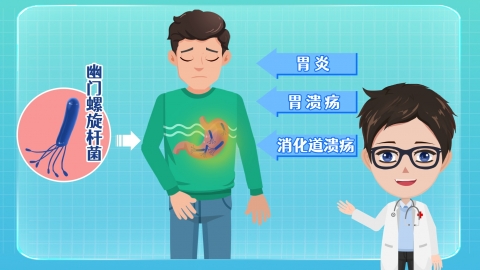Why Gastric Ulcers May Cause Fainting
Generally, gastric ulcers may cause fainting due to pain stimulation, poor nutrient absorption, gastrointestinal bleeding, concurrent pyloric obstruction, or ulcer perforation. If discomfort occurs, prompt medical consultation at a regular hospital is recommended. Detailed explanations are as follows:
1. Pain Stimulation
Severe pain during a gastric ulcer attack can trigger a stress response in the body, causing vasoconstriction and blood pressure fluctuations, which may lead to transient cerebral ischemia and fainting. Pain-relief medications such as ibuprofen sustained-release capsules or acetaminophen tablets can be taken under medical guidance. Adequate rest and avoidance of emotional stress are also recommended.
2. Poor Nutrient Absorption
Gastric ulcers can impair gastric digestive function, leading to incomplete digestion and hindered nutrient absorption. Long-term complications may include anemia and hypoglycemia, which can cause fainting. A diet of easily digestible, nutrient-rich foods such as steamed egg and millet porridge is recommended. Additionally, compound digestive enzyme capsules may be used under medical supervision to aid digestion.

3. Gastrointestinal Bleeding
Gastric ulcers eroding surrounding blood vessels can cause bleeding. Minor bleeding may present no obvious symptoms, but increasing blood loss can lead to anemia and insufficient oxygen supply to the brain, resulting in fainting. Prompt medical attention is necessary. Hemostatic medications such as omeprazole enteric-coated capsules, tranexamic acid tablets, and thrombin lyophilized powder may be administered under medical guidance. Blood transfusion may be required in severe cases.
4. Gastric Ulcer with Pyloric Obstruction
Recurrent gastric ulcers may lead to pyloric stenosis or even obstruction, preventing normal gastric emptying and causing frequent vomiting, which can result in dehydration and electrolyte imbalance, potentially leading to fainting. Fasting and fluid intake restriction are necessary, with intravenous fluids and electrolytes administered to restore balance. Under medical guidance, medications such as lansoprazole enteric-coated tablets and amoxicillin capsules may be used to control the ulcer.
5. Gastric Ulcer Perforation
Severe gastric ulcers may perforate, allowing gastric contents to enter the abdominal cavity and cause acute peritonitis, leading to severe abdominal pain, septic shock, and fainting. Immediate surgical intervention is required, followed by postoperative antibiotic therapy using medications such as ceftriaxone sodium for injection and metronidazole injection to prevent infection.
In daily life, maintaining regular eating habits and avoiding spicy, excessively cold, or hard foods is important. Smoking and alcohol consumption should be avoided to reduce gastric mucosal irritation. Maintaining a positive mindset and avoiding excessive fatigue are also recommended. Regular gastric examinations should be conducted to detect and manage any changes in condition promptly.










